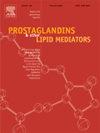Effect of curcumin on lipid mediators, glycemic index, and oxidative stress and inflammation biomarkers in polycystic ovary syndrome: Future directions and current knowledge – A systematic review
IF 2.5
3区 生物学
Q3 BIOCHEMISTRY & MOLECULAR BIOLOGY
Prostaglandins & other lipid mediators
Pub Date : 2025-01-13
DOI:10.1016/j.prostaglandins.2024.106947
引用次数: 0
Abstract
Polycystic ovary syndrome (PCOS) is one of the most common and important polygenic endocrine disorders among women of reproductive-aged. Current treatments are mostly used only to control the signs and symptoms of the disease, while not being able to completely prevent complications. Curcumin is one of the active compounds in turmeric, which is commonly used for a wide range of metabolic and inflammatory diseases. Therefore, this systematic review was performed to evaluate the effect of curcumin supplementation on PCOS. The current systematic review was performed according to the guidelines of the 2015 PRISMA (Preferred Reporting Items for Systematic Review and Meta-Analysis) statements. We searched ProQuest, PubMed, Google Scholar electronic, Scopus, and Cochrane, Embase, and Science Direct databases and on articles published up until November 2024. All of the animal studies (seven studies) and clinical trials (five studies) included in this systematic review that assessed the effect of curcumin on, reproductive hormones and metabolic risk markers in PCOS were published in English-language journals. Most studies supported the beneficial effects of curcumin on folliculogenesis, ovarian histomorphology, and luteinization processes. The effects of curcumin on decreasing the levels of luteinizing insulin resistance luteinizing hormone (LH), Follicle-stimulating hormone (FSH)and testosterone, were also reported. Curcumin also improved dyslipidemia, but no significant effect on weight loss has been reported. It is suggested that the effect of curcumin in PCOS is more related to the antioxidant and anti-inflammatory properties of curcumin than to the effects of weight loss. Therefore, this study provides evidence that curcumin can be considered an effective factor in reducing the complications of PCOS. However, due to the low number of human studies in this field, further clinical trials are warranted to verify these outcomes.
姜黄素对多囊卵巢综合征中脂质介质、血糖指数、氧化应激和炎症生物标志物的影响:未来方向和现有知识的系统回顾
多囊卵巢综合征(PCOS)是育龄妇女最常见、最重要的多基因内分泌疾病之一。目前的治疗大多只用于控制疾病的体征和症状,而不能完全预防并发症。姜黄素是姜黄中的活性化合物之一,常用于多种代谢性和炎症性疾病。因此,本系统综述旨在评价姜黄素补充剂对PCOS的影响。目前的系统评价是根据2015年PRISMA(系统评价和荟萃分析首选报告项目)声明的指南进行的。我们检索了ProQuest、PubMed、谷歌Scholar electronic、Scopus、Cochrane、Embase和Science Direct数据库,以及截止到2024年11月发表的文章。本系统综述中评估姜黄素对多囊卵巢综合征生殖激素和代谢风险标志物影响的所有动物研究(7项研究)和临床试验(5项研究)均发表在英语期刊上。大多数研究支持姜黄素对卵泡形成、卵巢组织形态学和黄体生成过程的有益作用。姜黄素对降低促黄体生成素(LH)、促卵泡激素(FSH)和睾酮水平的影响也有报道。姜黄素也能改善血脂异常,但对减肥没有显著影响。提示姜黄素对多囊卵巢综合征的治疗作用更多地与姜黄素的抗氧化和抗炎作用有关,而不是与减肥作用有关。因此,本研究为姜黄素可被认为是减少PCOS并发症的有效因素提供了证据。然而,由于该领域的人体研究数量较少,需要进一步的临床试验来验证这些结果。
本文章由计算机程序翻译,如有差异,请以英文原文为准。
求助全文
约1分钟内获得全文
求助全文
来源期刊

Prostaglandins & other lipid mediators
生物-生化与分子生物学
CiteScore
5.80
自引率
3.40%
发文量
49
审稿时长
2 months
期刊介绍:
Prostaglandins & Other Lipid Mediators is the original and foremost journal dealing with prostaglandins and related lipid mediator substances. It includes basic and clinical studies related to the pharmacology, physiology, pathology and biochemistry of lipid mediators.
Prostaglandins & Other Lipid Mediators invites reports of original research, mini-reviews, reviews, and methods articles in the basic and clinical aspects of all areas of lipid mediator research: cell biology, developmental biology, genetics, molecular biology, chemistry, biochemistry, physiology, pharmacology, endocrinology, biology, the medical sciences, and epidemiology.
Prostaglandins & Other Lipid Mediators also accepts proposals for special issue topics. The Editors will make every effort to advise authors of the decision on the submitted manuscript within 3-4 weeks of receipt.
 求助内容:
求助内容: 应助结果提醒方式:
应助结果提醒方式:


